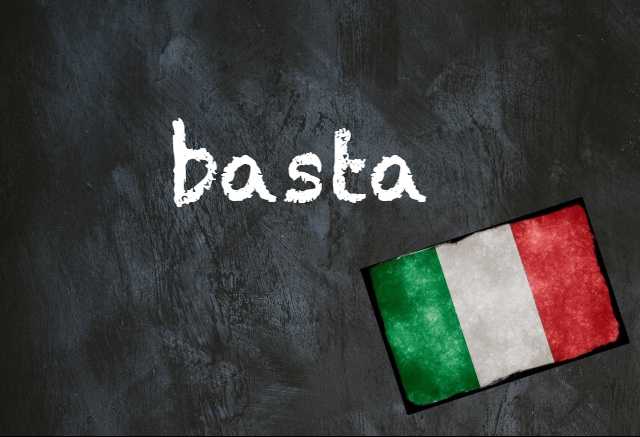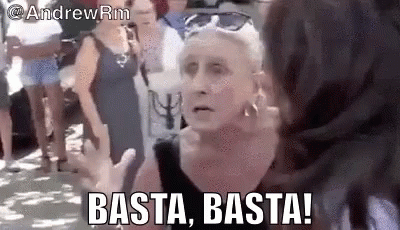
Italian word of the day: 'Basta'

Enough already! Just read on and learn this word.
It's been said that Italians are some of the best talkers in the world. They're also – in our humble opinion – the best at telling you when to shut up.
Today's word is a wonderfully peremptory phrase for signalling that you've had just about all you can take: basta. It means 'that's enough!' and we like to imagine saying it while reclining on a divan and raising a single finger to signal our displeasure.
Ora basta!
Enough already!
Of course, whoever's listening to you should get the hint and realize that what you're really saying is: 'Stop'. You can specify exactly what afterwards, with or without using con ('with').
Basta con questo chiasso!
Stop this racket!
Basta parlare!
No more talking!
You can also direct basta at more abstract targets: you might hear it chanted at protests or spot it on placards, where it's the equivalent of 'down with...'
Basta ingiustizie.
Down with injustice, no more injustice.

Not that basta always has to be angry. You can also use it as a neutral phrase to close one conversation or activity and move on to the next.
Basta, me ne vado.
Right then, I'm off.
And you'll hear it all the time in shops or restaurants when staff want to check if you've finished ordering.
– Basta così?
– Grazie, basta così.
– Is that everything? (literally, enough like that?)
– That's it, thanks.
Also – and here's where context comes in – basta can be an encouragement rather than a reprimand. Take the example we used earlier, basta parlare: yes, if you're angry it might mean 'enough talking already!'; but said in a different tone, it could also be 'it's enough to talk' or 'all you have to do is talk'.
There's no grammatical difference between the two meanings; this is one you'll just have to judge for yourself.
Basta il pensiero.
It's the thought that counts (literally, the thought is enough).
Basta la parola.
Just say the word (literally, the word is enough).
The other form you should be aware of is basta che..., which is an informal way of saying 'provided that...' or 'so long as...' You'll need to follow it with the subjunctive.
Potete giocare, basta che non rompiate niente.
You can play, so long as you don't break anything.
Did we cover everything? It'll do. Now feel free to tell us – waving that finger – 'Basta!'

Do you have an Italian phrase you'd like us to feature? If so, please email us with your suggestion.
Comments
See Also
It's been said that Italians are some of the best talkers in the world. They're also – in our humble opinion – the best at telling you when to shut up.
Today's word is a wonderfully peremptory phrase for signalling that you've had just about all you can take: basta. It means 'that's enough!' and we like to imagine saying it while reclining on a divan and raising a single finger to signal our displeasure.
Ora basta!
Enough already!
Of course, whoever's listening to you should get the hint and realize that what you're really saying is: 'Stop'. You can specify exactly what afterwards, with or without using con ('with').
Basta con questo chiasso!
Stop this racket!
Basta parlare!
No more talking!
You can also direct basta at more abstract targets: you might hear it chanted at protests or spot it on placards, where it's the equivalent of 'down with...'
Basta ingiustizie.
Down with injustice, no more injustice.

Not that basta always has to be angry. You can also use it as a neutral phrase to close one conversation or activity and move on to the next.
Basta, me ne vado.
Right then, I'm off.
And you'll hear it all the time in shops or restaurants when staff want to check if you've finished ordering.
– Basta così?
– Grazie, basta così.
– Is that everything? (literally, enough like that?)
– That's it, thanks.
Also – and here's where context comes in – basta can be an encouragement rather than a reprimand. Take the example we used earlier, basta parlare: yes, if you're angry it might mean 'enough talking already!'; but said in a different tone, it could also be 'it's enough to talk' or 'all you have to do is talk'.
There's no grammatical difference between the two meanings; this is one you'll just have to judge for yourself.
Basta il pensiero.
It's the thought that counts (literally, the thought is enough).
Basta la parola.
Just say the word (literally, the word is enough).
The other form you should be aware of is basta che..., which is an informal way of saying 'provided that...' or 'so long as...' You'll need to follow it with the subjunctive.
Potete giocare, basta che non rompiate niente.
You can play, so long as you don't break anything.
Did we cover everything? It'll do. Now feel free to tell us – waving that finger – 'Basta!'

Do you have an Italian phrase you'd like us to feature? If so, please email us with your suggestion.
Join the conversation in our comments section below. Share your own views and experience and if you have a question or suggestion for our journalists then email us at [email protected].
Please keep comments civil, constructive and on topic – and make sure to read our terms of use before getting involved.
Please log in here to leave a comment.